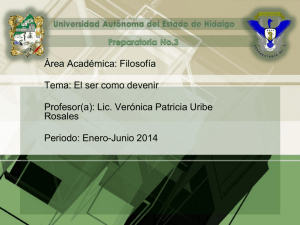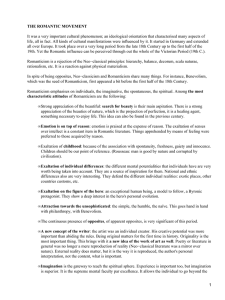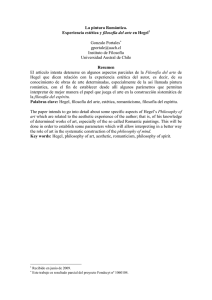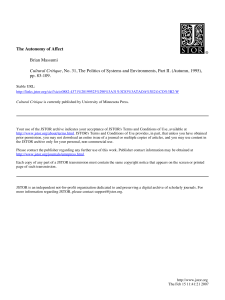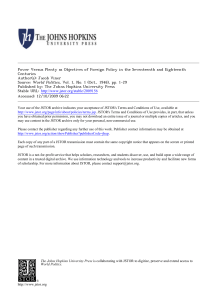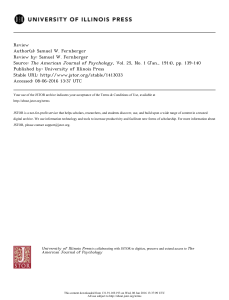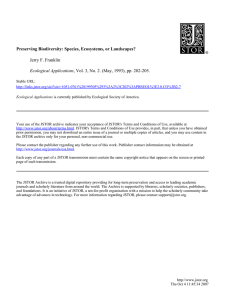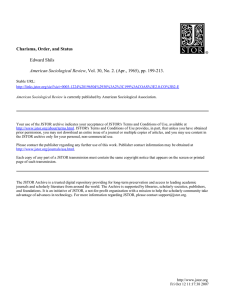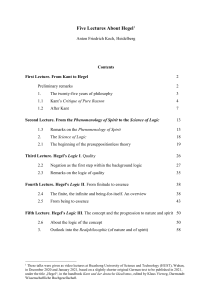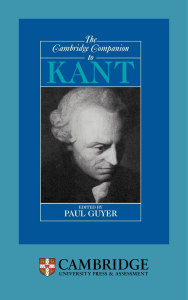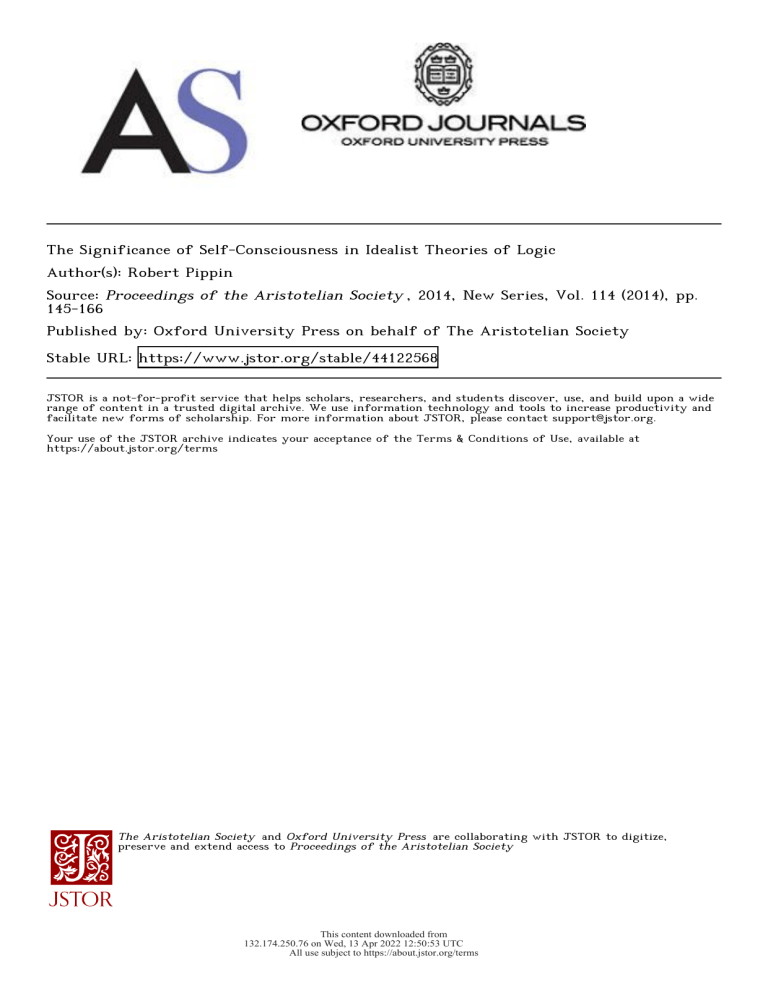
The Significance of Self-Consciousness in Idealist Theories of Logic Author(s): Robert Pippin Source: Proceedings of the Aristotelian Society , 2014, New Series, Vol. 114 (2014), pp. 145-166 Published by: Oxford University Press on behalf of The Aristotelian Society Stable URL: https://www.jstor.org/stable/44122568 JSTOR is a not-for-profit service that helps scholars, researchers, and students discover, use, and build upon a wide range of content in a trusted digital archive. We use information technology and tools to increase productivity and facilitate new forms of scholarship. For more information about JSTOR, please contact [email protected]. Your use of the JSTOR archive indicates your acceptance of the Terms & Conditions of Use, available at https://about.jstor.org/terms The Aristotelian Society and Oxford University Press are collaborating with JSTOR to digitize, preserve and extend access to Proceedings of the Aristotelian Society This content downloaded from 132.174.250.76 on Wed, 13 Apr 2022 12:50:53 UTC All use subject to https://about.jstor.org/terms Meeting of the Aristotelian Society held at Senate House, University of London, on 27 January 2014 at 5:30 p.m. VII - The Significance of Self-Consciousness in Idealist Theories of Logic Robert Pippin Among Kant's innovations in the understanding of logic ('general logic') were his claims that logic had no content of its own, but was the form of the thought of any possible content, and that the unit of meaning, the truth-bearer, judgement, was essentially apperceptive. Judging was implicitly the consciousness of judging. This was for Kant a logical truth. This article traces the influence of the latter claim on Fichte, and, for most of the discussion, on Hegel. The aim is to understand the relations among self-consciousness, reason and freedom in the Idealist tradition. Sebastian Rodi has rightly identified the heart of German Idealism, the principle 'that self-consciousness, freedom and reason are one' (Rodi 2007, p. 105). The fact that this formulation requires abstractions of this magnitude, and that the formulation is an identification of concepts that seem different, not identical, is not accidental. Arguably, the most ambitious and the most difficult single book in that post-Kantian Idealist tradition is Hegel's three-part, two-volume Science of Logic, (Arguably, because there are many other worthy contenders for the 'most difficult' title.) I propose to bring to bear Rödl's theory of self-consciousness on that book in a way that will demonstrate that what he identifies as the heart of German Ide- alism is certainly right. I am not sure that the uses to which I will put his theory in discussing the Logic are, at the end of the day, still recognizably his, but his account opens up a way of discussing the importance of the topic of self-consciousness for what both Kant and the post-Kantians called 'logic'. This is of course an insane proposal. 'Difficult' does not begin to describe The Science of Logic . But I will use Rödl's thesis as a focus for a reasonably manageable topic: the significance of self-consciousness for the general enterprise of the book, as a 'logic'. Hegel's book can be said to stand in a tradition of 'philosophical logic' ©2014 The Aristotelian Society Proceedings of the Aristotelian Society ; Vol. CXI V, Part 2 doi: 10. llll/j. 1467-9264. 2014. 00368.x This content downloaded from 132.174.250.76 on Wed, 13 Apr 2022 12:50:53 UTC All use subject to https://about.jstor.org/terms 146 ROBERT PIPPIN that includes Kant's Transcendental Logi hre , Frege's Begriffsschrift , Wittgenstei Logical Investigations. (Actually the trad 'philosophy', given the importance of th works like Plato's Sophist and Aristotle the key to understanding his approach c Kant's theory of logic, and I should men first is that Kant does not understand logi formulae and rules for truth-preservin logic is a theory of thinking. (His logic i ositional, logic.) But it is not, as in the Por the rules for thinking, either descriptively rules for how we do think and make infer should. For Kant, logic sets out the rules such, and so its scope is far wider than, more than truth-bearers. It covers impe ments (which have only 'subjective unive to Port Royale, not 'following' those rule thinking irrationally. It is not thinking key thesis from his critical philosophy i absolutely unrestricted. Logic has no co parent to the ontological structure of reali lian and Wolffian accounts of logic). Th exclusively discursive, can provide itself have content only by means of sensible e Kant's view about the constitutive status o premiss from Kant's transcendental phi this point in what follows. But Kant's other innovation was to insist that the 'I think' must be able to accompany all my representations, all my judgements. Judging, believing, acting are all inherently and necessarily self-con- scious. That is the notion I want to explore below. There is no question that the notion is extremely important to the Logic , which could fairly be said to everywhere about, in one way or another, the problem Hegel calls 'the unity of the concept'. That is clear from a single, famous passage in which that phrase occurs. It is one of the profoundest and truest insights to be found in the Critique of Reason that the unity which constitutes the essence of the concept is recognized as the original synthetic unity of apperception, ©2014 The Aristotelian Society Proceedings of the Aristotelian Society, Vol. CXIV, Part 2 doi: 10 . 1 1 1 1/ j . 1467-9264 . 2014 . 00368 . x This content downloaded from 132.174.250.76 on Wed, 13 Apr 2022 12:50:53 UTC All use subject to https://about.jstor.org/terms SELF-CONSCIOUSNESS IN IDEALIST THEORIES OF LOGIC 147 the unity of the 'I think', or of self-consciousness. - This proposition is all that there is to the so-called transcendental deduction of the cat- egories which, from the beginning, has however been regarded as the most difficult piece of Kantian philosophy ... (SL 12.18)1 Roughly, the thought behind such remarks is this. What Kant called the original synthetic unity of apperception is what Hegel calls 'the essence of the unity of the concept'. This could be understood initially in a formal sense. Both unities are classic cases of 'one over many'. Even an empirical concept like red remains identifiable as the same red, the same colour, even in all the many and various instances and shades in which it appears. Analogously, the manifold of experience counts as a unity among such a manifold in all being ascribable to one I, that identical, self-same I who has all such experiences. But both Hegel and Kant do not want to merely point out a structural analogy. The unity of apperception is the unity of a concept. That is, as Kant makes clear, to say that experience is always subject to the original synthetic unity of apperception is to say that it is always subject to the understanding, the power of conceiving. So this is the power to hold things together as one, necessary for ex- perience to have a unity ascribable to an identical I. Discriminating what belongs together with what, what is connected to what in a temporal order, knowing that the successive perceptions of a house do not count as the perception of a succession in the world, requires an apperceptive unity; it does not just happen to consciousness. What happens is mere succession. Such a unity is possible only selfconsciously and it is the actualization of the power of conceiving. But the unity effected by the power of conceiving (where 'conceiving' means conceiving, not merely thinking together) is the represen- tational unity that makes reference to an object possible. Unifying by 'red' achieves the unity that says how things are. It, the rose, be- longs with the red things; not with what has seemed red-like to me before. Without this ability to distinguish how things are from how they seem to me, there would be as many Ts as arbitrarily associated seemings; and no unity of self-consciousness. Or, achieving the unity of self-consciousness is differentiating seeming from being, 1 The Science of Logic {SL) is cited by volume and page number of the standard German edition of Hegel's collected works; translations are from the Cambridge edition by George di Giovanni. Citations of Hegel's Encyclopedia ( E ) are given by paragraph number. Publication details are given in the References section below. ©2014 The Aristotelian Society Proceedings of the Aristotelian Society, Vol. CXIV, Part 2 doi: 10. 1111/j. 1467-9264. 2014. 00368.x This content downloaded from 132.174.250.76 on Wed, 13 Apr 2022 12:50:53 UTC All use subject to https://about.jstor.org/terms 148 ROBERT PIPPIN and so the rules for that distinction, cat such unity. In other words, the 'conditions rience are at the same time the conditio jects of experience'.2 Kant proposed an a unity that could be said to be a product associative unity, presupposed what he finity', that is, a power to distinguish a m tations from a representation of objecti power, there could be no 'one over many one I, one experiences Hegel does not rel inner sense like this, and argued, as ab correctly that the unity of any concept is and that such a unity is what establish object, then the categories, as the moment fying power, will thereby be shown to representation of objects. Or, a rigorou properly conceived , is the only deduction With this brief background, the first tas overview of what The Science of Logic i will lead naturally into Rödl's account of will try to draw out some implications o structure and movement of the book. I Although Hegel devotes surprisingly little space to any discussion of what he is doing in the book (in effect, he just does it),3 the ambition of the treatise as a 'logic' appears to concern the very possibility of rendering anything intelligible, where that could mean a number of things - offering a satisfying explanation,4 giving an account, ton 2 Henrich (1982) has suggested two other ways in which objectivity, the possibility of true subject-predicate predication, depends on self-consciousness. Such predication is the ascription of a general term to a particular. But the successful identification of the particular requires the use of indexicals, which in turn require the mastery of the first-person pronoun and all that entails. Any subject that can refer must also have identified itself (Henrich 1982, p. 135). And, in way close to that described here, the intelligibility of any proposition presupposes the possibility of propositional assertion (Satzbehauptung) , which requires differ- entiating how it seems to me from how it is. Necessarily, anyone capable of such a distinction is self-aware (Henrich 1982, p. 136). 3 Compare with Theunissen (1978, pp. 88 rr.), and Jaschke s response (2010, p. 222). 4 'Satisfying' in the sense mentioned in £ §17. ©2014 The Aristotelian Society Proceedings of the Aristotelian Society, Vol. CXIV, Part 2 doi: 10. 1111/j. 1467-9264. 2014. 00368.x This content downloaded from 132.174.250.76 on Wed, 13 Apr 2022 12:50:53 UTC:56 UTC All use subject to https://about.jstor.org/terms SELF-CONSCIOUSNESS IN IDEALIST THEORIES OF LOGIC 149 logon didonai , or justifying a deed. What is in question at such a level of attempted comprehensiveness in The Science of Logic is, or at least appears to be, something like an account of all possible account-givings , a scope that would include everything from ethical justifications to empirical judgements to the concept of explanation presupposed by the Second Law of Thermodynamics.5 (This signals his acceptance of Kant's first innovation.) The most ambitious goal of Hegel's Logic is to show that the variety of accounts is finite and that not only are these forms of account-giving not incommensurable but they are in some way interdependent. Thinking, on such an account, is not a perceiving or a grasping, although a perceiving or grasping can be the ground of having understood something or the ground of claiming something to be the case. A thinking is aimed at getting something in some sense right; paradigmatically in a knowing. Of course, what it is to get something right, holding to be so ap- propriately, rendering successfully intelligible, is also one of the contents we want to get right. This creates the self-reflective paradox of what Hegel calls the Logic of the Concept, or the concept of the concept. This will clearly require a theory of conceptuality, the heart of the determinate generality presumed in account-giving formulated whatever way one likes: judging (asserting), explaining, understanding.6 In an assumption Hegel shares with Kant, any such accountgiving or rendering intelligible is always necessarily discursive. Any determinate concept is itself some sort of 'result' of a determination involving other concepts. So in the Logic , an array of concepts (or concept kinds) - being, nothing, becoming, something, other, finitude, infinitude, the one, the many, continuity, discrete magnitude, number, measure, essence, appearance, identity, difference, contra5 The basic claim is that Hegel's Encyclopedia is best understood as a theory of explanatory adequacy , an enterprise that must presuppose a general account of any possible account-giving. See also Pippin (2008, ch. 2), which is a later version of an article written in 1999. That work concentrated on the implications of such an approach for Hegel's account of 'nature' and 'spirit' and the relation between them, and did not address the ambitions of a Science of Logic. A preliminary account of what that (the Logic as about possible intelligibility, explanatory adequacy) might look like was presented in Pippin (1989, p. 40) on an 'account of all account giving', but that was sketchy and programmatic. (And I am certainly not the only one defending the centrality of explanation and explanatory success in understanding the Logic . See Pinkard (1988) on 'the explanation of possibility'.) It seems to have left the impression with some that the position attributed to Hegel was: an investigation of 'how we have to think about things', what the requirements for pure thinking of anything are, be the world as it may. That was certainly not the position attributed. ©2014 The Aristotelian Society Proceedings of the Aristotelian Society , Vol. CXIV, Part 2 doi: 10. 1111/j. 1467-9264. 2014. 00368.x This content downloaded from 132.174.250.76 on Wed, 13 Apr 2022 12:50:53 UTC All use subject to https://about.jstor.org/terms I50 ROBERT PIPPIN diction, ground, relation, concept, ju 'the idea of the true' and 'the idea of make appearances like characters in s gle to make a case for themselves, as if only to fail in some unusual way, and to successful successors, which themselv enough that the central problem seem determinacy of these basic rules for p right account of their conceptual co knowing in the general sense of intendi to be 'determining and determinate t This is just a first pass at familiarizing will recur in different forms constan very crudely, these 'kinds' of determina ferent 'logics' in basic assertion types forms, Hegel wants to argue for the and inter-relatedness of the forms, ' a i sarily F; and 'tf is a good F. Various higher-order concepts are sa possible determinations, ranging fro 'law', to 'universality', 'life' and 'th these concepts can be understood to b is clearly that they can be shown to b determination (in different ways, in and their content is a matter of bot ments' and 'external' dependence on r wise 'negative' 'moments'. For Hegel as for many others, the c 6 The relations between concept, judgement, syllog of an 'account', will emerge frequently in what fol prise comes from Frege, when, in The Foundations logic were not like the laws of nature, but were 'th §87). As we shall see, Hegel too wants to say that th things or objects, but to the ' Sache ' or the ' Wesenhe this, Hegel is distinguishing the question of actuality, from questions abut existence. It is the kind of issu is 'really' religious; peyote smoking, say. We don't d know its 'essentiality', Wert , Sache an sich selbst , exist; we want to know if they are actually rights- to the question 'What is there?' is easy: everything thing is an actuality. 7 Hegel speaks often of the 'inner drive' propelling ©2014 The Aristotelian Society Proceedings of the Aristotelian Society, Vol. CXI V, doi: 10 . 1111/ j . 1467-9264 . 2014 . 00368 . x This content downloaded from 132.174.250.76 on Wed, 13 Apr 2022 12:50:53 UTC All use subject to https://about.jstor.org/terms SELF-CONSCIOUSNESS IN IDEALIST THEORIES OF LOGIC 1 51 what is the case, and so these constitutive moments of any possible intelligible assertion are the 'forms of reality'. This marks his break with Kant. Any assertable claim (of various sorts) must be an expression of such conceptual specifications of possible intelligibility, and these intelligibility conditions constitute the possibility of intelligible bearers of truth (judgements). The forms of intelligibility are the forms of what could be true, and so of what possibly is, although they do not settle the question of what, in particular, is true. What we want to know is both something about the material relations of exclusion necessary to differentiate and render contentful these higher-order concepts (this is the famous topic of dialectical negation), and why there should be some inherent problem, some unavoidable inconsistency or antinomy, under the specific assumptions of each 'logic', in specifying those internal and external relations. Here is a summary claim by Hegel that begins to indicate the bearing of Rödl's topic on the Logic : 'As science , truth is pure self- consciousness as it develops itself and has the shape of the self , so that that which exists in and for itself is the known [gewußte] concept and the concept as such is that which exists in and for itself' (SL 21.33, my emphasis).8 A strange and complicated double identity: first, science, developing self-consciousness, in the shape of a self, and truth all form one identity; all of which is supposed to allow us to conclude a second identity: being in and for itself and the 'known' concept. In the first edition of the Logic , he simply says that ' truth [the truth of being, the determination of what things truly are] is self-consciousness [the forms of self-conscious judgement]'.9 To understand this, we need to understand more of Hegel's relation to Kant. 8 There are passages like this from the Philosophy of Spirit : 'Was gedacht ist, ist; und daß, was ist, nur ist , insofern es Gedanke ist' ( E §465). But it is clear that by this point in the Encyclopedia , Hegel is not talking about what merely exists, and suddenly turning into Bishop Berkeley by claiming esse est percipl. (He says 'Gedanke', not ' gedacht '.) What a thing truly or actually is, is its concept, and a concept is not a self-standing 'thought' but a moment in a network of mutually interdefining rules of determination. 9 ' Oder der Begriff der Wahrheit ist, daß die Wahrheit das reine Selbstbewußtsein sey ...' (SL II. 21). ©2014 The Aristotelian Society Proceedings of the Aristotelian Society, Vol. CXiv, Part 2 doi: 10 . 1111/ j . 1467-9264 . 2014 . 00368 . x This content downloaded from 132.174.250.76 on Wed, 13 Apr 2022 12:50:53 UTC All use subject to https://about.jstor.org/terms 152 ROBERT PIPPIN II The vast disagreements between Kant and Hegel are well known, especially about such issues as idealism and the thing in itself. But there is deeper agreement than disagreement between Kant and Hegel on 'the logic of possible thinking' when one notes how much of what Kant wants to distinguish as general logic already relies, in his own words, on his transcendental theory, and that has to mean: on the transcendental determination of possible content. To mention the point on which the heart of the theoretical issue between Kant and Hegel turns, in the Critique Kant writes, 'And thus the synthetic unity of apperception is the highest point to which one must affix all use of the understanding, even the whole of logic and, after it, transcendental philosophy; indeed this faculty is the understanding itself' (Bi34n.). This is tied to an even more general point: I find that a judgment is nothing other than the way to bring given cognitions to the objective unity of apperception. That is, the aim of the copula is in them: to distinguish the objective unity of representations from the subjective. For this word designates the relation of the representations to the original apperception and its necessary unity , even if the judgment itself is empirical, hence contingent, e.g. 'Bodies are heavy'. By that, to be sure, I do not mean to say that these representations necessarily belong to one another in the empirical intuition, but rather that they belong to one another in virtue of the necessary unity of the apperception in the synthesis of intuitions, i.e. in accordance with the principles of the objective determination of all representations insofar as cognition can come from them, which principles are all derived from the principle of the transcendental unity of apperception. (Kant, Critique of Pure Reason B142) This is a new theory of judgement, and accordingly grounds a new understanding of logic, especially the logic of concepts and judgement. Such an interpretative claim makes clear that, somewhat contrary to Kant's own presentation, general logic is an abstraction from a more original and basic theory, in Kant's language a transcendental theory of the possible conceptual determination of an ob- ject (the 'logic' that 'coincides with metaphysics' in Hegel's account), and not some basic, 'empty' form to which 'content' is added. It all also entails that what we have to call Kant's 'theory of thinking' ('account-giving', judging) has a component that is not something merely supplemental to the basic features of his general ©2014 The Aristotelian Society Proceedings of the Aristotelian Societyy Vol. CXIV, Part 2 doi: 10 . 1 1 1 1 / j . 1467-9264 . 2014 . 00368 . x This content downloaded from 132.174.250.76 on Wed, 13 Apr 2022 12:50:53 UTC All use subject to https://about.jstor.org/terms SELF-CONSCIOUSNESS IN IDEALIST THEORIES OF LOGIC 153 or content-less logic as rules for valid judgings and inferrings. It is, rather, the basic feature: judging is apperceptive. This is a logical truth, a truth in, of, general logic, as the B 134 passage insisted. And that has to mean, in a very peculiar sense important to Hegel, but which will take some time to unpack, that such judgings are necessarily and inherently reflexive, and so at the very least are self-referential, even if such a reflected content is not substantive, does not refer to a subject's focusing on her judging activity, as if a second consciousness of the event of thinking. That is, to judge is not only to be aware of what one is judging, but that one is judging, asserting, claiming something. If it were not apperceptive like this, it would be indistinguishable from the differential responsiveness of a thermometer, and thermometers cannot defend their claims or readings. But one is not, cannot be, simultaneously judging that one is judging. Rather, judgement somehow is the consciousness of judging. These are not two acts, but one. As Rodi puts it, 'The spontaneity of thought is of a special kind: it is a spontaneity whose acts are knowledge of these very acts' (2007, p. 14). 10 (We should note that in this tradition, propositional structure, considered on its own, represents nothing, because it claims nothing.) Kant was well aware that with this notion of apperceptive judging he was breaking with the rationalist (and Lockean) notion of reflection as inner perception, and as we shall see, Hegel's language is everywhere carefully Kantian in this respect.11 Since self-conscious10 This principle has implications for action as well; for example, that I know what I am doing by being the person who does it; that I know that I believe something by believing it; that 'My knowing that p includes and is included in my knowing that I know it, which latter knowledge therefore is unmediated first person knowledge' (Rodi 2007, p. 139); that 'actions do not point to a state of mind as to their cause. Acting intentionally is being of a certain mind' (Rodi 2007, p. 49). This latter is a Hegelian thought, albeit with implications others than those Rodi draws. See Pippin (2008, pp. 147-79). 11 For example, when discussing Fichte, he says, 'If other Kantians have expanded on the determining of the intended object by the "I" by saying that the objectifying of the "I" is to be regarded as an original and necessary deed of consciousness, so that in this original deed there is not yet the representation of the "I" - which would be only a consciousness of that consciousness, or itself an objectifying of that consciousness - then this objectifying deed, liberated from the opposition of consciousness, is closer to what may be taken simply as thinking as such. But this deed should no longer be called consciousness; for consciousness holds within itself the opposition of the "I" and its intended object which is not to be found in that original deed. The name "consciousness" gives it more of a semblance of subjectivity than does the term "thought", which here, however, is to be taken in the absolute sense of infinite thought, not as encumbered by the finitude of consciousness; in short, thought as such' (SL 21.47-8). ©2014 The Aristotelian Society Proceedings of the Aristotelian Society, Vol. CXIV, Part 2 doi: 10. 1111/j. 1467-9264. 2014. 00368.x This content downloaded from 132.174.250.76 on Wed, 13 Apr 2022 12:50:53 UTC All use subject to https://about.jstor.org/terms 154 ROBERT PIPPIN ness is the form of all possible know will hang on what we should call the a relation, where we mean not what we tention to ourselves, but in what relat we claim something or act. It is, however, extremely difficult to f Rodi says: not two acts but one. I know beliefs, by being the believer, by bein lieves. But the grammar of the formu of theoretical knowledge are also , bes state of affairs, 'knowledge of these v tion: 'judgement is, is identical with, i sciousness of judgement' introduces t and object into the apperceptive dime confusing.) In knowing that the book something about the book and someth edge, why are there not two acts? (There which my assertion itself could be the tude, in response, say, to someone as claim!' But that is a special circumstan tiveness.) I cannot be a believer unles and I know that by being the believer what exactly do I know by being the b proposition 'I am the believer' is true quainted with a special object, myself thing. Again, that formulation, 'know would seem to mean: I also know that but then we would be off to the regr misapprehensions pertain to the form to analyse a genuine unity of dispara That unity is nothing but the conscio consciousness of that unity is nothing ot it is conscious.) There must be some way of saying th sion of thought and action is a matter of a belief avowed, or an action underta to many similar problems taken by R 'self-consciously', rather than accomp with, another act of consciousness. The example, is the consciousness of action ©2014 The Aristotelian Society Proceedings of the Aristotelian Society, Vol. CXI V, P doi: 10 . 1111/ j . 1467-9264 . 2014 . 00368 . x This content downloaded from 132.174.250.76 on Wed, 13 Apr 2022 12:50:53 UTC All use subject to https://about.jstor.org/terms SELF-CONSCIOUSNESS IN IDEALIST THEORIES OF LOGIC 155 also a being conscious of what one is doing. Acting is being conscious of what one is doing. So there is a self-referential component in any judgement or action (7 think this, I act thusly'), but it can be misleading to think that this is the same problem as, for example, 'How does the first-person pronoun have sense, and thereby pick me uniquely out').12 I understand this adverbial qualification to be suggested by Rodi in his discussion of what he calls an unmediated way of knowing, 'from the inside', not of some 'other' or by any inner perception. Knowing from the inside (by being the knower) is 'a way of knowing such that my first-person reference is constituted by a relation I bear to the object - identity - by which I know it in this way ' (Rodi 2007, p. 10; my emphasis). Or by the precision of his saying, 'when I know an object in a first-person way , I know it by being that ob- ject' (Rodi 2007, p. 98). This question (' What exactly do I know besides what I believe by being the believer?') is the same question as 'How can the self-relation inherent in all cognitive relation to the world announced by Kant, and in all action, which self-relation certainly has the grammatical form of a dyadic relation, not be a dyadic relation, but be the expression of an identity?' Since self-consciousness is the basic struc- tural feature of knowledge and action according to Rodi, the supreme necessary condition for anything being believing or acting, everything depends on the right formulation and drawing the right implications. I don't know what I am doing by identifying myself with the one acting, but by being the one acting. So how can such a Two also be One? We are in the middle of everything of significance in Hegel's Logic , not to mention Fichte's Wissenschaftslehre and Schelling's early idealism. We are at the heart of the problem they called Identitätstheorie . (For example, in Fichte's early versions of the Wissenschaftslehre , the possibility of the I's or ego's identification of itself in all its experiences mirrors the 'division' at the heart of any statement of identity, a division that is also somehow not a division, as in the difference between ' A is A and simply 'A'. In fact, he 12 See Ryle (197 9, p. 24): 'To X, thinking what one is doing, is not to be doing both some Xing and some separately do-able Y-ing; it is to be X-ing under a variety of qualifications, such as X-ing on purpose, with some tentativeness, some vigilance against some known hazards, some perseverance and with at least a modicum of intended or unintended self-training. It is to X intentionally, experimentally, circumspectly and practisingly, and these by themselves are not additional things that he is doing or might be doing.' ©2014 The Aristotelian Society Proceedings of the Aristotelian Society ; Vol. CXIV, Part 2 doi: 10. 1111/j. 1467-9264. 2014. 00368.x This content downloaded from 132.174.250.76 on Wed, 13 Apr 2022 12:50:53 UTC All use subject to https://about.jstor.org/terms 156 ROBERT PIPPIN argues, the very intelligibility of any stat presupposes the I's self-identity and self-d identified as A unless the T of the 'first' A second A and knows it is. And since identit any possible intelligibility, the issue is, i mordial.) This too is important to state carefully. Hegel scholars often assume that Hegel inherits 'identity philosophy' from Schelling, and that it means 'the identity of subject and object'. They then formulate various philosophically implausible versions of such an identity, such as that true reality is divine thought thinking itself, that objects are moments of this thought's 'intellectual intuition of itself'. But the Logic is not committed to anything remotely like this. As we shall see in more detail in a moment, in thinking of identity, Hegel is first of all thinking of self-consciousness in any consciousness, where the subject of knowledge is identical with itself, where there is no difference between the subject and the object of its knowledge; all of this as Rodi formulates it in his own terms. And Rodi is ex- pressing a Hegelian thought when he says that this is not just a feature of an isolated problematic, a theory of self-consciousness. This unusual identity is constitutive of 'theoretical thought' as such. Theoretical thought, he says, 'is a reality that includes its subject's knowledge of it' (Rodi 2007, p. 101). So a subject's knowledge 'that and why she believes what she does, which she expresses in giving the explanation, is not a separate existence from what it represents. It includes and is included in the reality of which it is knowledge' (Rodi 2007, p. 101). This has an important implication. The theoretical thought of any content cannot be understood as the momentary or punctated grasp of a solitary item. The thought of the content is also, is identical with, the thought of whatever reasons there are to delimit a concept in such a way and not some other; for example, the thought of discreteness, in its contrast with continuity, or the thought of essence in its contrast with appearances. We are not thinking of discreteness if we cannot think of what such a notion excludes, presupposes, requires, if we have no idea how such discrete magnitudes could form a continuum. These are, for Hegel, reasons which differentiate it from its contrary. Reasons that allow success in distinguishing the content from its complements or contraries. That the thought of the content is also the thought of my thinking it has this implication, is ©2014 The Aristotelian Society Proceedings of the Aristotelian Society, Vol. CXI V, Part z doi: 10 . 1 1 1 1 / j . 1467-9264 . 2014 . 00368 . x This content downloaded from 132.174.250.76 on Wed, 13 Apr 2022 12:50:53 UTC All use subject to https://about.jstor.org/terms SELF-CONSCIOUSNESS IN IDEALIST THEORIES OF LOGIC 157 what that apperceptive element amounts to. But now we can try to explain something that can sound very extreme, which Rodi alludes to but does not develop. In a swipe at empiricism, he notes that thought has the power to be the principle of the existence of its objects. He does not say one object, thought itself, but all its proper objects. To some this will sound like Fichte, that the Ich , in positing itself, posits the Nicht-Ich. That is absolutely right, but not in the sense in which it is usually understood. Consider this passage from The Second Introduction' to the 1796/1799 Wissenschaftslehre (nova methodo ), translated as Foundations of Transcendental Philosophy . The passage I am interested in follows a general claim that 'The idealist observes that experience in its entirety is nothing but an acting on the part of a rational being' (Fichte 1998, p. 105). There then follows a gloss on 'the viewpoint of idealism': The idealist observes how there must come to be things for the individual. Thus the situation is different for the [observed] individual than it is for the philosopher. The individual is confronted with things, men, etc., that are independent of him. But the idealist says, There are no things outside me and present independently of me'. Though the two say opposite things, they do not contradict each other. For the idealist, from his own viewpoint, displays the necessity of the individual's view. When the idealist says, 'outside of me', he means 'outside of reason'; when the individual says the same thing, he means 'outside of my person'. (Fichte 1998, pp. 105-6). So to bring all this together: Judgement is the consciousness of judgement. But one is 'conscious of judging' in an unusual way, by being the judger. Being the judger, believer or thinker of anything is as if in answer to the question what ought to be judged, believed or thought in that way. This means, at the highest abstraction, that the thought (belief, assertion) of some content (like finitude or causality) is at the same time the thought of the reasons that are required for such an 'answer'. If the thought of objects (as a successful thought) is identical in this way with the thought of what is presupposed and required for such a determination, then there is a way of stating the identity of subject and object, or the Ich' s determination of the ©2014 The Aristotelian Society Proceedings of the Aristotelian Society, Vol. CXIV, Part 2 doi: 10. 1111/j. 1467-9264. 2014. 00368.x This content downloaded from 132.174.250.76 on Wed, 13 Apr 2022 12:50:53 UTC All use subject to https://about.jstor.org/terms 158 ROBERT PIPPIN Nicht-Ich in its positing of itself that tion from Fichte just given. The determination of the object as tha object is at the same time the determinat subject's reasons) to so determine it. Finally, thought can also investigate w posed, what is required, in order to jud determinately any content. It does not le ence; does not apprehend them as ideal It has to be said to give them to itself. The record of some such attempts is Th Since these meta-concepts are the forms ly said, and what is truly said is what forms of reality. Herein lies another lesson, though, in the right formulation. Rodi, in discussing th der, inferential relations, believing q bec plies q , argues that such inferences themse be a reason it is right to believe somethin inference from something else one believ reveal the order under which I bring my lieve' (Rodi 2007, p. 70). He recalls his pr where he had shown that a chain of prac ing terminates 'in a finite end that no long tive order under which the conclusion is (p. 70). Likewise, he says now, in theoret inferences must terminate in beliefs that n are the order to which beliefs inferred fr Later he will say that 'the order of infer (p. 88). Rather, 'inference is governed by an forms in acts of believing that something i power of knowledge' (p. 88). This is a dif 'that' clause could modify 'order' or 'acts ity does not affect the point I want to mak It cannot be the case that this moment t of the whole order of inferences is itself th ©2014 The Aristotelian Society Proceedings of the Aristotelian Society ; Vol . CXIV, Part doi: 10 . 1111/ j . 1467-9264 . 2014 . 00368 . x This content downloaded from 132.174.250.76 on Wed, 13 Apr 2022 12:50:53 UTC All use subject to https://about.jstor.org/terms SELF-CONSCIOUSNESS IN IDEALIST THEORIES OF LOGIC 159 lief or representation. We would be heading straight for Carroll's paradoxes of Achilles and the tortoise. It must be that what it is to determine what it is right to believe because of what else one believes is itself , just thereby, 'to reveal the order under which I bring myself in asking what to believe'. And this in the same difficult-tostate way that judgement is the consciousness of judgement. And in just the same way that, being committed to the truth of a proposition, I am just thereby committed to the denial of everything inconsistent with it. The latter is not a separate inference I draw, on the basis of my first commitment. It is a dimension of the content of my first commitment. This is not to say I must be conscious of these implications and incompatibilities. Just that I could not be thinking that content were I not able to be responsive to such considerations. This is all so just as someone's believing something and her thought that it is something right to believe ' are the same reality ' (Rodi 2.007, P- 9*)-13 Reflection on these features of judging or believing or doing brings us back to our starting point.14 Their all being undertaken self-consciously means no one could be said to 'just' assert, or just believe or just act. Any such undertaking, if self-conscious, must be potentially responsive to the question of 'Why?'; that is, to reasons. (An assertion is such a responsiveness; the latter is not a secondary or even distinct dimension of the former.) And it is at least plausible to say that the greater the extent of such potential responsiveness (or said another way, the greater the self-understanding), the 'freer' the activity, the more I can be said to redeem the action as genuinely mine, back it, stand behind it, as mine. (We thus have that heart of German Idealism cited at the outset, the principle 'that self-consciousness, freedom and reason are one' - Rodi 2007, p. 105.) 13 Or see Rodi (2007, P- 96). His view is that the thought 'I believe that p because the thought Tt is right to believe p because resents the latter, the theoretical reasoning. But these are not two thoughts. He sa her thinking the thought that represents the causality is her thinking the thought causality'. Or (p. 97) the 'causality of the [belief] explanation contains the subj sentation of this very causality'. 14 Believing is more complicated, because there can be several things I believe th know I believe. But in determining what you believe, you are not searching in an tal inventory; you are determining what you take to be true, what you could app affirm. ©2014 The Aristotelian Society Proceedings of the Aristotelian Society, Vol. CXIV, Part 2 doi: 10. 1111/j . 1467-9264 . 2014. 00368 . x This content downloaded from 132.174.250.76 on Wed, 13 Apr 2022 12:50:53 UTC All use subject to https://about.jstor.org/terms l6o ROBERT PIPPIN III At this point, we have to note that Hegel adds his own unusual spin to this trio of abstractions. A proper understanding of the self's relation to itself in thinking, the form of any conceiving, and thereby of any concept understood as a moment of conceiving, and thereby any inferential relation, is also the core meaning of the what Hegel calls the 'infinity' treated by speculative philosophy (E §28 A), 15 all in contradistinction to (traditional) metaphysics, the domain of Ver- stand and finitude (E §27). Later in the Encyclopedia , Hegel states Kant's point in his own speculative language: 'What is here called object of reason, the unconditioned or infinite, is nothing but the self-equivalent [das Sich-selbst-Gleiche]; in other words, it is the original identity of the I in thinking' (E §45). I think that Rödl's formulations have given us some hope that we might understand why Hegel equates the 'object of reason' with 'the original identity of the I in thinking'. (Or why he calls 'truth' 'selfconsciousness'.) But Hegel's formulations about the infinite character of this self-relation are difficult. He has invoked a self-relation that is something like a circular structure, in which the self's self-relation never terminates in a distinct object or determinate posit (and so, despite appearances, is never dyadic), but in so attending, returns to it- self as the thinker of such a thought. It would have to, since the subject is the object it is aware of. The relation is to a 'self' that is the original subject of the relation; a relation, or a difference, even with such an identity, to insert Hegel's frequent way of framing the issue. This is 'infinity' in the proper sense, Hegel tells us frequently,16 and, as he says in his discussion of 'Being-for-self', 'Self-consciousness is thus the nearest example of the presence of infinity' (SL 21. 145). 17 15 The idea, which will recur frequently, of thought, in its relation to itself in any relation to an object, not being limited by its object, does not mean that subjects ultimately just decide what to affirm. 'Can' in this sense means that thought as such can be delimited (assert this, and not that) only by thought, not by non-thought. An essentially Fichtean point. 16 See Horstmann 's discussion of this claim in Horstmann (2006, pp. 69-84). Horstmann demonstrates that Hegel means by infinity 'self-related subjectivity' in this sense, but without more detail about what makes such 'subjectivity' subjective , there is a danger of reifying the Logic's object, as if some self-moving categorical structure in itself, or ' the logical proc- ess' (Horstmann 2006, p. 83). One can avoid attributing to Hegel a so-called subjectivistic, impositionist, noumenally ignorant idealism, without such a mystified 'objectivism'. For that matter, that characterization is unfair to Kant as well. 17 This is of course not the only concept of the infinite that Hegel treats in the Logic. In the section on Quantity in the Logic , for example, he discusses the mathematical infinite as it ©2014 The Aristotelian Society Proceedings of the Aristotelian Society, Vol. CXIV, Part 2 doi: 10. 1111/ j. 1467-9264. 2014. 00368.x This content downloaded from 132.174.250.76 on Wed, 13 Apr 2022 12:50:53 UTC All use subject to https://about.jstor.org/terms SELF-CONSCIOUSNESS IN IDEALIST THEORIES OF LOGIC l6i There has to be something of this thought in Rödl's position. The believer knows of her acts of believing not by inner perception or inference but by being the believer. But this 'identity' is not something like the identification of one thing with another, the way a reductionist would identify mental states with brain states (that is, claim there are only brain states). So occasionally Rodi must formulate more metaphorically. As we saw before, he says: a subject's knowledge 'that and why she believes what she does, which she expresses in giving the explanation, is not a separate existence from what it represents. It includes and is included in the reality of which it is knowledge' (Rodi 2007, p. 101). 'Includes' and especially 'included in' a reality of which she has knowledge sound metaphorically an idealist note (what is it for reasons to be included in a reality?), and also evinces some aspects of the 'identity and non-identity' language the idealists were fond of. (One can note the problem by comparing this language of 'including' with what he had said before. 'Her believing it and her thought that it is something right to believe are the same reality ' - Rodi 2007, p. 92; italics in original.) Hegel had said that the subject matter of the Logic is thinking (Denken), understood as an activity (Tätigkeit) which means it, thinking, is the 'active universal' (das tätige Allgemeine) (E §20) or the 'self-activating' (sich betätigende) universal, because the deed (Tat) or that brought about (Hervorgebrachte) is the universal (das Allgemeine). At the beginning of The Logic of the Concept, Hegel glosses this activity in a way that also expresses a Kantian thought. That is, he rejects the idea of the judgement as the combination of independent concepts, subjects and predicates, and insists instead that the relation between the determinacy of concepts and their roles in judgements is in effect one of identity; their determinacy is their role in judging. He has his own way of putting this, but I think the point is clear. He is trying to explain here what he means by say- ing that 'the Concept as such does not abide within itself [prozeßlos in sich verharrend] without development' (E §i66Z), calling the concept instead 'totally active' in that it is always 'distinguishing it- appears in the differential and integral calculus, and he engages in a critique of the notion of the 'infinitesimal'. (His general claim is that the ordinary notion of the infinite is 'contradictory' because it treats the infinite as finite, as the concept of what totality one would reach by conceiving of some endless series as a whole. The infinite is treated as a thing and not as the principle of the extension, as a function.) For the best discussion of Hegel's treatment of the mathematically infinite, see Pinkard (1988, pp. 45-54). ©2014 The Aristotelian Society Proceedings of the Aristotelian Society , Vol. CXI v, Part 2 doi: 10. 1111/j. 1467-9264. 2014. 00368.x This content downloaded from 132.174.250.76 on Wed, 13 Apr 2022 12:50:53 UTC All use subject to https://about.jstor.org/terms 1 62 ROBERT PIPPIN self from itself' (E §i66Z). This s Concept into the distinction of i own activity is the judgment , the ingly be conveyed as the particu Concept' (E §i66Z ; my emphasis) In Kant as well as in Hegel, con judgements, even the concepts o which is necessary for any empir possible. This means, that con 'grasped' as determinate entities. duces what Hegel is forever calli concepts. (This truth is part of w logik ; learning that it is not possib minacy this way, all by assuming that the Seinslogik can be deeply tertaining concepts as such, one this claim, we can recall here the that the Gestalt, the in science, the truth form, of conc is self-conscio Concepts have the form of a self i perceptive predication, self-conscio tive structure - knowledge of th knowledge of the considerations they are what they are (in this r mined to be, necessarily in al determination. This alone will be the source of the claim for the 'logical movement' in the greater Logic , and through such logical movement, a finally determinate logical order. Judgement is said to be the 'determining of the Concept through itself' (SL 12.53) and is said to be 'the realisation [Realisierung] of the concept, for reality [Realität] denotes in general the entry into existence as determinate being' (SL 12.53) Or: concepts are only determinate by virtue of 18 His own paraphrase of this claim will require some preparation to understand properly: 'If we advance from this to the judging of the object, the judgment is not our subjective doing, by which this or that predicate is ascribed to the object; on the contrary, we are considering the object in the determinacy that is posited by the concept' ( E §i66Z). So the idea that one sometimes hears, that if we can figure out the 'dialectical method' at the beginning, in the first transitions, we will have a fix on the 'method' and understand it later in the work, is misguided. Nothing could be further from the Hegelian truth. Compare to Henrich's clear statement of the problems we get into when we take such an approach (Henrich 1971a, p. 81). ©2014 The Aristotelian Society Proceedings of the Aristotelian Society, Vol. CXIV, Part 2 doi: 10 . 1 1 1 1/ j . 1467-9264 . 2014 . 00368 . x This content downloaded from 132.174.250.76 on Wed, 13 Apr 2022 12:50:53 UTC All use subject to https://about.jstor.org/terms inte SELF-CONSCIOUSNESS IN IDEALIST THEORIES OF LOGIC 163 their roles in judgement, the 'bringing to the objective unity of apperception', in Kant's definition. So a concept like 'essence', for example, can be said to be delimitable as just that concept by virtue of its possible uses in various con- trasts with 'appearance', or by virtue of its negation (in the grand structure of the Logic) of the concept 'being' or its role in distinguishing accidental from essential predicates. These are all roles in judgements (and are thereby tied to judgemental roles in inferences). Any of these uses, though, involves any such claim in a network of justifications, a normative order. The application of any such concept in judgement, since apperceptive, self-consciously applied, must be, just thereby, responsive to its possible misapplication, and the question of the general contours of its correct use implicates any one notion in the normative proprieties governing many others. Hence the course of the 'movement' of the Logic . With this topic of 'infinity', though, we are at the very limits now of being able to follow Hegel, at least at my limits. We still need some non-metaphorical sense of how, in non-empirical cases, settling on some determination of conceptual content, because necessarily self-conscious, is a settling on, at the same time, much more than an isolated or punctated grasp of anything. That the self-relation involved in such a full determination, in effect, thought's deter- mination of its own possibility (the possibility of rendering determinately intelligible at all), should be understood as 'infinity', does not seem very helpful. It might help us understand why Hegel sometimes seems to say that knowing or determining one content would be to know or determine everything, but that does not advance our understanding of the issue itself. It would be reasonable to say that, formulated this way, the prospect of understanding the structure of this self-relation in some sys- tematic way (and by hypothesis that would mean understanding the possibility of intelligible knowing and acting) is impossible, and the impossibility represents the failure of German Idealism. This is Dieter Henrich's claim. We could conclude from this either that we have made a wrong turn somewhere and must begin anew or that the issue itself - or the complex of issues, self-relation in relation to the world, practical self-knowledge in action that involves no strange inner eye - does not allow a systematic, only an 'approximate' or indirect, articulation of value as a weapon against naturalism. (The latter is Henrich's position; merely 'approximate' is his term.) Or we ©2014 The Aristotelian Society Proceedings of the Aristotelian Society, Vol. CXIV, Part 2 doi: 10. 1111/j . 1467-9264. 2014. 00368 . x This content downloaded from 132.174.250.76 on Wed, 13 Apr 2022 12:50:53 UTC All use subject to https://about.jstor.org/terms 164 ROBERT PIPPIN could hope that the problem in formul from the limitations inherent in a kind calls the formulations of Verstand , and of the 'logic of thought', of intelligibility, equate to this infinite self-relation. Thi tion in The Science of Logic . Said more self-relation in thinking and acting is the understand in understanding ourselves a Hegel in effect claims, we are captured ture of how to achieve this understandi ness' and 'objects'. The Phenomenolo helped us, therapeutically, break the hold o ic the one thing required is that we unders empiricist picture, that thought, the Co tent, but 'gives itself' its own content. Thi Rödl's formulation, and it is the final e standing 'the heart of German Idealism'. That is, we need to begin by realizing the conceptual content involved in the t consists of determinate attempts at pred level of abstraction of the Logic , the level tions that have empirical, scientific and guments, the role of self-consciousness i of such an enterprise has a distinct feature at the same time conscious of such determ just by being the act of determination. Bu implicated in a normative order, the rea hibit some such determination, but ultim which would be needed for a successful determination. In that sense we have to say that the I's being itself in its thinking and acting is at the same time it's not being fully or wholly itself. Its reasons, under some finite set of assumptions about qualitative predication or essential predication, run out. Being itself and not being itself, that is, not being able to fulfil the intention resolved (to adequately determine content), places me in a state of opposition with myself that Hegel calls a contradiction, not at all in the formal logical sense (i.e. something logically false), but in the ordinary sense when we say to someone, 'You're contradicting yourself'. It is clear enough what is at stake for Hegel in such a self-determi- nation, and it is clear in another register in Rödl's book. The culmi©2014 The Aristotelian Society Proceedings of the Aristotelian Society, Vol. CXIV, Part 2 doi: 10. 1111/j. 1467-9264. 2014. 00368.x This content downloaded from 132.174.250.76 on Wed, 13 Apr 2022 121 Jan 1976 12:34:56 UTC All use subject to https://about.jstor.org/terms SELF-CONSCIOUSNESS IN IDEALIST THEORIES OF LOGIC 165 nation of the course of the demonstration in the Logic is the Logic of the Concept (or the concept of the concept, thought's determination of its own possibility), about which Hegel says that having reached this realm we have reached the realm of subjectivity and freedom. Later, in the account of the Logic of the Concept itself, he says that 'In the concept, therefore, the kingdom of freedom is disclosed' (SL 12.15). In the Addition to §31 of the Encyclopedia , Hegel waxes poetic over such 'logical' freedom, using a dramatic image to characterize the achievement of such a logic. Using his technical term for freedom, Beisichsein , being with oneself, he says, This being with self [ Beisichsein ] belongs to free thinking, a free voyaging, where, with nothing under us and nothing over us, in solitude, alone by ourselves, we are purely at home with ourselves' (E 98).20 This sets the bar pretty high for a poor commentator, but, if these considerations are right, then at least we can have some sense what stakes we are playing for and what the game is. Department of Philosophy University of Chicago 1 1 1 5 East 58 th Street Chicago , IL 60637 USA [email protected] References Works by Hegel: E : Enzyklopädie der philosophischer Wissenschaften im Grundrisse , erster Teil : Die Wissenschaft der Logik. 3rd edn. Heidelberg, 1830. Reprinted in Werke , Band 8. Edited by Eva Moldenhauer and Karl Markus Michel. Frankfurt am Main: Suhrkamp, 1970. SL : Wissenschaft der Logik , vol. 1: Die objektive Logik. Nürnberg, 181213. Reprinted in Gesammelte Werke , vol. 11: Wissenschaft der Logik , erster Band : Die objektive Logik (1812/13). Edited by Friedrich Hogemann and Walter Jäschke. Hamburg: Felix Meiner, 1978. Reprinted in Gesammelte Werke , vol. 12: Wissensch zweiter Band: Die subjektive Logik (1816). Edited by 20 He explains the freedom theme a bit more in E §23. ©2014 The Aristotelian Society Proceedings of the Aristotelian Society, Vol. cxiv, Part 2 doi: 10. llll/j. 1467-9264. 2014. 00368.x This content downloaded from 132.174.250.76 on Wed, 13 Apr 2022 12:50:53 UTC All use subject to https://about.jstor.org/terms 1 66 ROBERT mann and PIPPIN Walter Jäschke. Hamburg Lehre vom Sein . Stuttgart and Tübingen, 1832. Rep Werke , vol. 21: Wissenschaft der Logik, Teil I: D Band I: Die Lehre vom Sein (1832). Edited by Frie Walter Jäschke. Hamburg: Felix Meiner, 1985. Cambridge: Cambridge University Press, 2010. Works by other authors: Fichte, Johann Gottlieb 1998: Wissenschaftslehre lated by Daniel Breazeale as Foundations of Tran Ithaca, NY: Cornell University Press. Frege, Gottlieb 1980: The Foundations of Arithme ical Inquiry into the Concept of Numbers , 2nd J. L. Austin. Oxford: Blackwell. Henrich, Dieter 1971a: Anfang und Methode der Logik . In Henrich 1971b, pp. 73-94- Philosophische Essays , pp. 125-81. Frankfurt a Horstmann, Rolf-Peter 2006: 'Substance, Subjec Study of the Role of Logic in Hegel's System'. (ed.), Hegel: New Directions , pp. 69-84. Durham Jäschke, Walter 2010: Hegel Handbuch. Leben , Stuttgart: J. B. Metzler. Kant, Immanuel 1781/1787: Critique of Pure Rea ed by Paul Guyer and Allen Wood. Cambridge Press, 1998. Pinkard, Terry 1988: Hegel's Dialectic: The Expl Phaldelphia, PA: Temple University Press. Pippin, Robert 1989: Hegel's Idealism: The Satisfa ness. Cambridge: Cambridge University Press. Cambridge: Cambridge University Press. Rodi, Sebastian 2007: Self -Consciousness. Cambridg versity Press. Ryle, Gilbert 1979: 'Adverbial Verbs and Verbs of Thinking , pp. 17-39. Edited by Konstantin Kolend tion by G. J. Wärnock. Oxford: Basil Blackwell. Theunissen, Michael 1978: 'Begriff und Realität. Auf sischen Wahrheitsbegriff'. In R.-P. Horstmann (ed in der Philosophie Hegels. Frankfurt am Main: Suh ©2014 The Aristotelian Society Proceedings of the Aristotelian Society ; Vol. CXI V, Part 2 doi: 10. 1111/j. 1467-9264. 2014. 00368.x This content downloaded from 132.174.250.76 on Wed, 13 Apr 2022 12:50:53 UTC All use subject to https://about.jstor.org/terms
